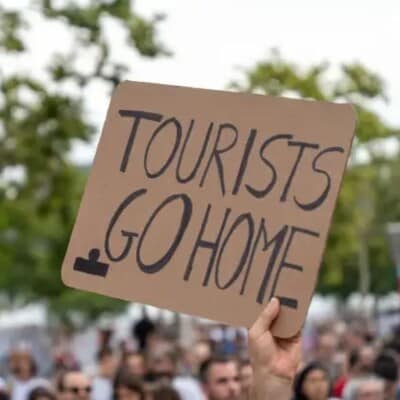3 min read Last Updated: July 29, 2024 | 12:59 PM IST
Anti-tourism protests have been gaining momentum across Europe this summer, with large demonstrations occurring in the Netherlands, Greece and especially Spain.
Protests in Spain
In early July, protesters in Barcelona marched through popular tourist destinations, chanting “tourists go home” and spraying unsuspecting visitors with water pistols. Thousands recently took to the streets of Mallorca, where organizers claim the island’s tourism model is “impoverishing workers and making a few rich.”
The roots of mayhem
At the heart of these protests is the growing problem of rising rents and house prices that are making it increasingly difficult for residents to own a home. Carlos Ramirez, a teacher in Barcelona, has saved for years to buy his first home and earns a “decent” salary funded by the government. But with house prices soaring in the Catalan capital, Ramirez, like many others, fears being evicted.
Ramirez, 26, blames mass tourism for the rising costs: “It’s becoming harder and harder for locals, especially young people, to have their own place,” he told CNN.
“As the years have passed, we’ve seen an increase in tourists coming,” he added.
Barcelona’s mayor, Jaume Corboni, said rents in the city have risen 68 percent over the past decade, a trend he said was similar in other European cities.
The wider issue
The protests reflect a deeper issue of unsustainable tourism management. Antje Martins, an expert on sustainable tourism at the University of Queensland, says the protests reflect wider dissatisfaction with tourism management. Residents feel that they are not benefiting from the influx of tourists, even though wages are often low and some work in the tourism industry itself.
“When you see residents clashing against tourism, it reflects their dissatisfaction because they don’t get any benefit from tourism,” Martins told CNN.
Government response and measures
In response to these problems, several European cities have taken steps. Venice introduced temporary entrance fees to regulate tourist numbers, bringing in more revenue than expected. Similarly, the mayor of Barcelona has announced plans to increase the city’s tourist tax on some cruise passengers and suspend licenses for around 10,000 apartments currently approved for short-term rental.
Demarketing Campaign
Some cities have resorted to “demarketing campaigns” to scare away certain types of tourists: Amsterdam’s 2023 “Stay Away” campaign targeted male tourists aged 18 to 35, warning them about the consequences of anti-social behaviour; but such measures can have unintended consequences, such as higher prices and further gentrification.
The ongoing protests and measures highlight the need for balance in tourism management. “It’s important to create a situation where the money that tourists make, or that we make from tourists, is invested in places, in jobs, so that people can make a living,” Martins said. Until that balance is achieved, the protests are likely to continue.
First Published: 29 July 2024 | 12:59 PM IST

